Table of Contents Show
Is your mind set on buying a fifth-wheel trailer? It’s wise to invest a generous amount of time researching a product before making a significant purchase. The last thing you want is to regret buying a fifth wheel because you weren’t fully prepared for what you’re committing to!
Deciding to buy a fifth wheel requires time and effort to make an informed decision. Even with spending hours upon hours researching and walking through dozens of different models, there’s still a chance of regretting your purchase. Today we want to share with you five common fifth wheel regrets buyers might experience.
What Is a Fifth Wheel?
A fifth wheel is a specific type of camping trailer connected to a tow vehicle via a fifth-wheel hitch. This hitching style uses a gooseneck or kingpin to connect the trailer and tow vehicle.
These are often larger trailers that can weigh up to 20,000 lbs. A fifth-wheel camper usually has a residential feel inside and a tremendous amount of storage in outside compartments.
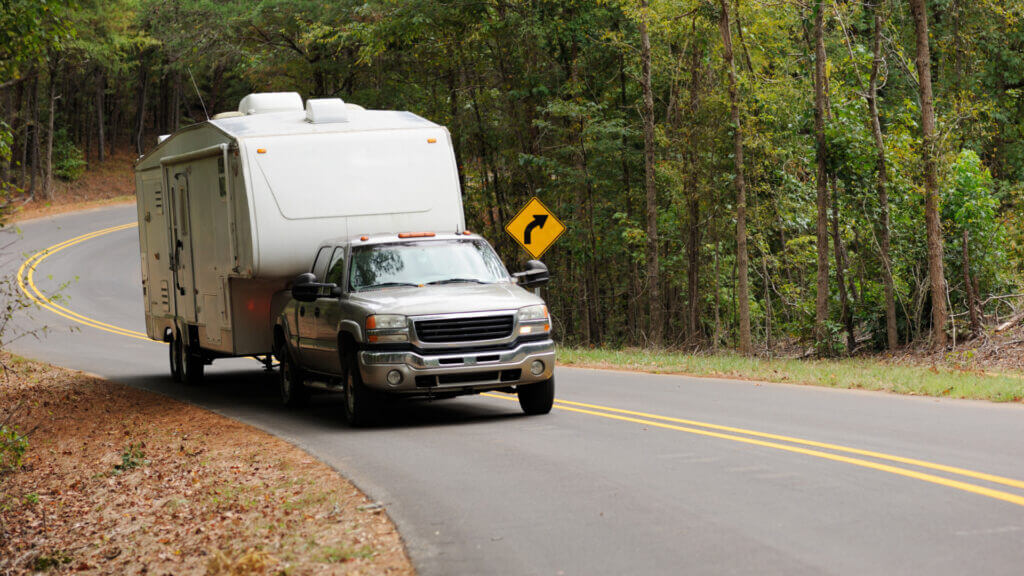
1. Requires a Large Truck
These trailers are often larger and heavier, requiring a bigger truck. If you don’t already have a capable truck, you’ll need to purchase one if you plan on towing your RV from site to site. A truck capable of pulling larger fifth wheels can be incredibly expensive and costly to maintain.
You’ll often find that these trucks have diesel engines designed to handle heavier loads. The price of diesel varies from state to state, but it’s often pricier than gasoline. Depending on your camping and travel style, you may be surprised by how much fuel you’ll need.
Many RVers dream of owning a big RV and truck; however, they quickly regret their purchase when bills start showing up each month.
2. Hitching and Setting up Takes Time… And Lots of Practice
Learning to hitch and set up a fifth wheel takes significant time and practice. It requires your utmost attention to ensure everyone’s safety. Skipping a step can easily result in damaging your fifth wheel or tow vehicle and possibly even injuring yourself or others.
This process can be stressful at first, which causes many RVers to regret their fifth wheel purchase. However, the more you practice setting up your fifth wheel, the easier it becomes. While it may appear as simple as pushing a button, there are many essential steps before using the auto-level feature.
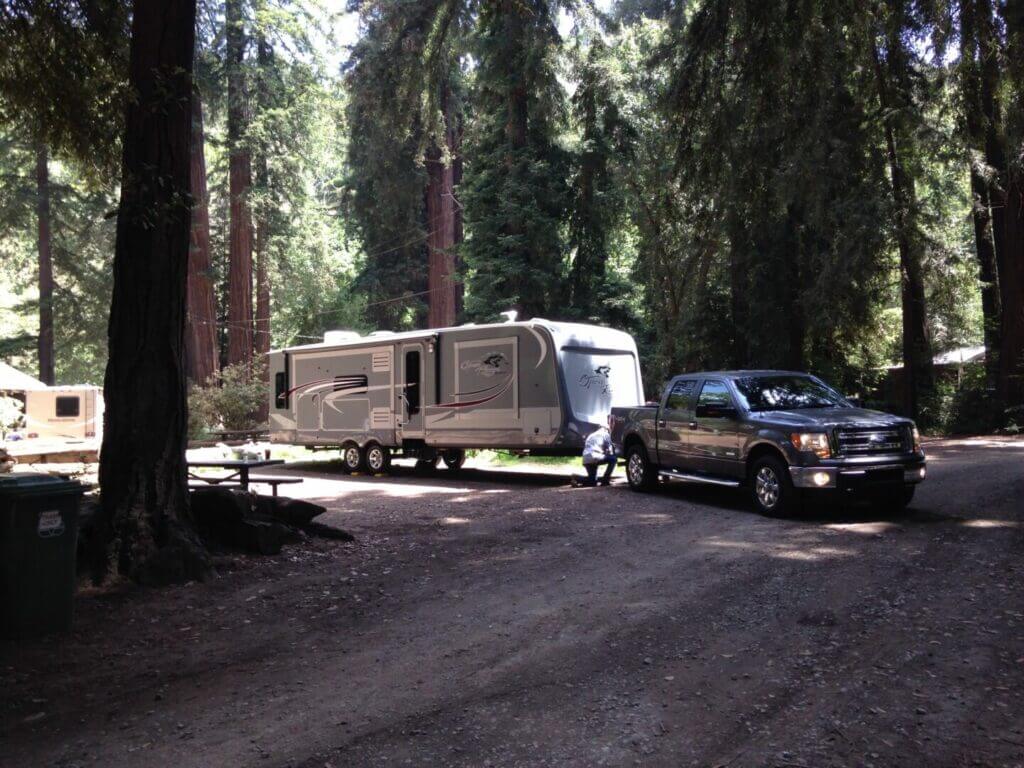
3. No Access to Living Quarters When Driving
Because you’re towing the RV behind you, you’ll need to find a convenient spot to pull over to access the fifth wheel’s living quarters. Twenty-one states allow passengers to ride in a fifth wheel while in motion. It would be an incredibly bumpy and possibly terrifying experience that we can’t imagine attempting, though.
Even if you can find a convenient and safe place to pull over, you may have difficulty accessing your RV due to the slides. You may need to open a slide or two to access essential amenities like the kitchen or restroom. These inconveniences often lead a fifth-wheel buyer to regret the purchase.
4. Can’t Tow a Car
Many RVers enjoy using a smaller, more fuel-efficient vehicle as their everyday ride. While roughly half of the states in the U.S. allow triple towing, fifth wheels are not rated to tow a vehicle behind them safely. You may carry bicycles or a small trailer but towing a vehicle as your triple tow can be dangerous.
Not having access to an additional vehicle often leads buyers to regret purchasing a fifth wheel. If you’re planning to use another car other than your tow vehicle, a fifth wheel may not be the best option for you.
5. Most Start Around 30+ Feet
Driving a big truck can be a difficult adjustment for some. Tack on an additional 30+ feet, and it can be enough to send some RVers over the edge. Depending on the size of your family, finding a fifth-wheel floor plan to meet your needs might mean looking at longer ones.
Many state and national park campgrounds require RVs to be under 30 feet in length. Finding fifth wheels under 30 feet can be difficult, if not impossible. Many regret their fifth wheel purchase when discovering their new RV is too big to fit into their favorite campground.
Benefits of Fifth Wheels
While some regret their fifth wheel purchase, many don’t. Let’s take a look at a few benefits of choosing a fifth wheel.
Most Floor Plan Options
Due to their larger size, manufacturers can offer creative floor plan options. If you have a favorite manufacturer, they likely have several different floor plans for each model line of RVs.
For example, Grand Design presents eight different floor plans in their Reflection line of fifth wheels. You’ll likely have several floor plan options to consider no matter what manufacturer you choose.
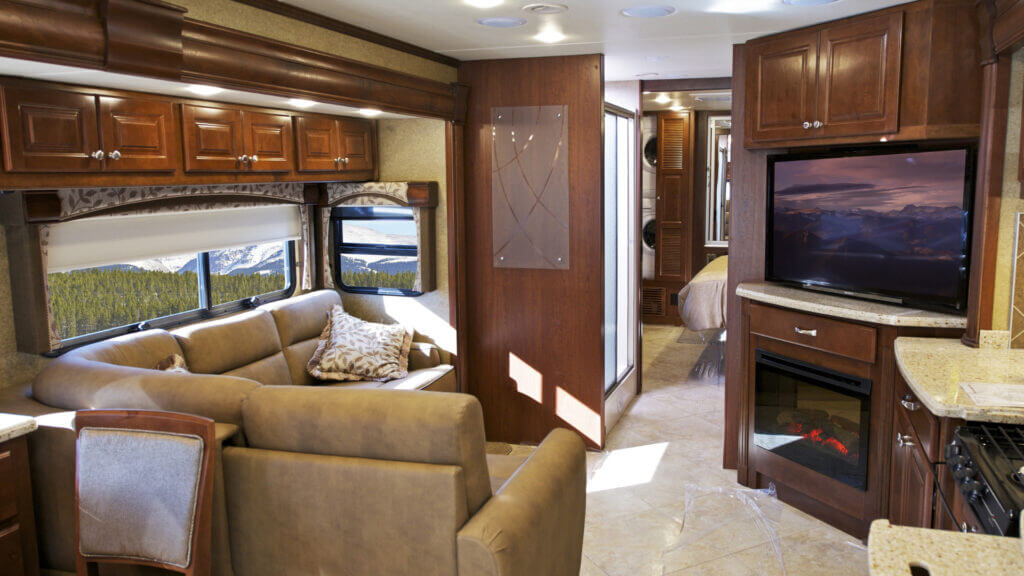
Lots of Storage
Many fifth-wheel owners love the massive amount of storage. This means those things you didn’t have space for before you can now easily store.
Separate Engine and Living Space
A tremendous benefit of owning a fifth wheel is that the engine and living space are separate. This means if you ever experience a mechanical issue with your engine, you’re not stuck having to find a hotel while your RV is in the shop.
You can leave your fifth wheel at camp and use your other vehicle to explore the rough roads you can’t take your RV on. This allows for more adventures.
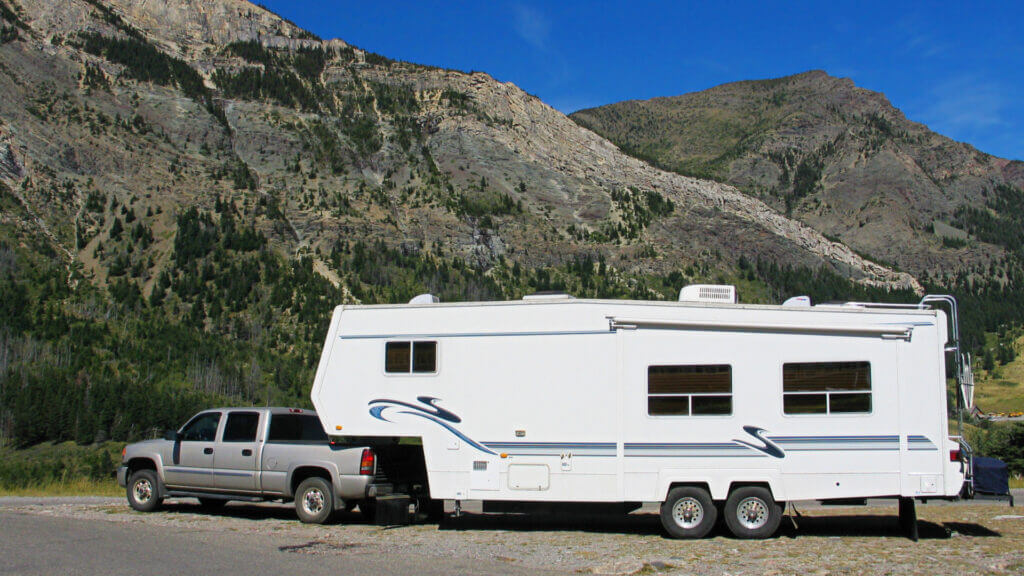
Making a Decision
Choosing which RV style is suitable for you is not a decision you can make quickly or lightly. Doing an adequate amount of research and consulting with experienced RVers is the best way to make sure you don’t regret your fifth wheel purchase. Have you ever regretted purchasing an RV?




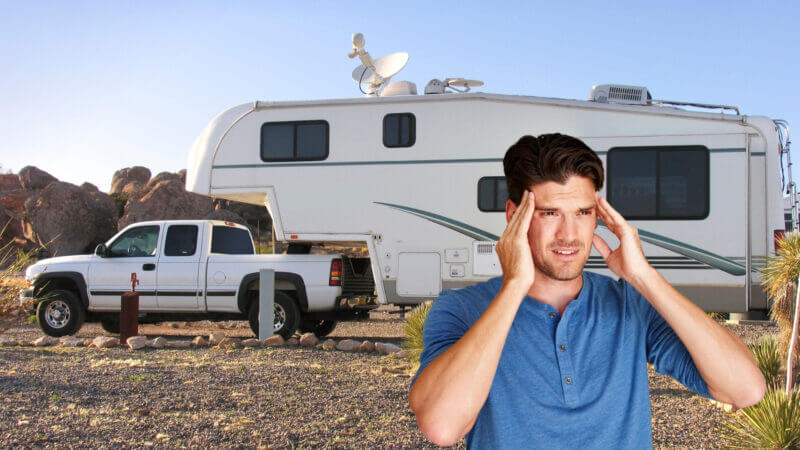


Big difference between fifth wheel and say a class a is the cost of insurance. For us the combination of trailer and truck was less than motor home. Worth checking out, of course that was a few years ago.
When we purchased the 5th wheel we hated it. So different from travel trailers! After the 4th or 5th time, we love it! There is a learning curve with this. But set up and take down is done in 15 minutes!
You ARE good ! The 5th Wheel owners we know cannot fathom doing it in 15 minutes. !
Fifth Wheels are the best of both worlds. Most smaller Class C under 30 ft cannot even pull a Toad. So your stuck where ever you park. The residential feel is a big plus to make your glamping a great experience. Your hitching and set up takes no longer than a Travel Trailer or a Class A with a toad. They all require you to pay attention to what you doing and making sure you did it right
Wife and I have owned bumper pulls, 5th wheels up to 40’ in length and 40’ Tiffin motorhome. Each and everyone served the purpose at the time we bought them. The worse thing in each one of them is the depression year to year. Make the right choice and plan on keeping what ever you buy and enjoy your traveling as we have. Be safe
Wow, we were really thinking about getting into RVing, but if it causes depression every year, what’s the sense? I mean, who wants to live every day dreading life and … sorry, what’s that … oh, now I get it. You must have meant depreciation. Carry on. 🙂
I was going to say something but I didn’t want to sound like the grammar police! You did it for me. I would go into RVing to get away from depression! 😅
They have medication and counseling for that condition. Its 2021, no excuse for not seeking treatment for depression.
We love our 41’ Solitude 375res. We started with a 28’ TT and it was horrible, almost gave up RVing. Horrible to hitch up, tow and live in. We can set up or tear down & hitch up in 20 minutes! We’ve lived full time in ours for 2 years now and can’t imagine having to pay for a Class A, especially gas, replacement of parts (horror stories about windshield replacements) and then having to tow a car. We love the space it gives us inside and out.
We have owned different types of RVs over the years, and I think some of your “regrets” are unwarranted. For example:
Cost: 1) I believe it’s *less* expensive to buy/maintain/register/insure a truck and 5th wheel than a comparable motorhome and toad. 2) You can fuel your truck at any gas station after dropping off the rig – cheaper prices and you don’t need to worry about getting your motorhome in and out. 3) As far as fuel costs per mile, we found little difference between our gasoline 25’ Class C, 31’ fifth wheel with diesel truck, and 30’ diesel Class A with toad.
Hitching and setting up: Different steps than a trailer or a motorhome with toad, but not really more difficult or time-consuming.
Layout: 1) Both 5th wheels and Class As generally start around 30 feet, although there are exceptions. 2) I simply wouldn’t consider a floor plan that doesn’t have access to the kitchen and bathroom when the slides are in. 3) We always pull over rather than walk in a moving motorhome…it’s just safer.
Speaking of safety: 1) Trucks have to meet standard vehicle safety standards that Class As do not. 2) Trailers are far more likely to “wag the dog” and cause an accident. 3) Class Cs typically have an extended (or overextended) frame, which can reduce safety as well as cargo capacity.
No toad: This is our biggest drawback (as it was with our 25’ Class C). But between bicycles, public transit or having to walk a little farther when parking, we make it work and feel it outweighs the disadvantages of other options.
Something to think about – we could park our trailer in our driveway. The fiver has to be stored at a storage facilitu an additional monthly expense.
I’ll have to disagree with the comments about riding in the fifth wheel. My wife and pets find it far quieter and smoother than riding in the truck. Also, as long as you pay attention when picking a floor plan, roadside stops are not a problem. My fifth wheel allows bath & bedroom access without moving any slides. And also allows frig and some pantry access. Remainder of trailer is available by only moving 1 slide out halfway.
I owned 2 bumper pull trailers before my fifth. The fifth is by far easier to hitch & unhitch.When backing, you can see the kingpin which makes all the difference. Plus I recommend power jacks, makes dropping and lifting a breeze.
They are also more stable to drive in crosswinds than any other RV type.
I have to say the one GIANT disadvantage is access to smaller parks. Esp because you need the truck & trailer hitched together while parking, making the rig 50’ or more. So we have learned to settle on FHU RV parks outside of national parks, and use the freedom of our unhitched truck to visit the park. That back at home we sleep like royalty!
We had a TT then upgraded to a 5th wheel, then met a Canadian who had a nice motor home, gas powered. I told him how nice it was! He said the money you have tied up in your 5th wheel and truck makes me think you could easily afford my motor home! Two years later we had a 38 ft 3 slide generator on board SunVoyager MH, no regrets!
You can tow a xtra car behind a fifth wheel. Takes no longer to set up than a motorhome with no Jack’s. Lot of the new fifth wheels also have hydraulic Jack’s now. I’ve had them all. Fifth wheels come in pretty much any length you want.
I have a 25ft coachman 5th wheel and no slide. Very light and pull it with a 3.7 f150 2011. Had a bigger one and had no problems. Being a retired trucker of 40yrs I prefer a 5th wheel. Much more stable and easy to maneuver
I’m almost 60 years old I own a home that I plan to sell in the next 2 years I also have a pice of of land 15 acres in east tx. Sulphur springs tx to be exact. Im thinking of buying a large rv big enough for my me and my wife and for my grand kids to stay when they visited us I’ll be short visits like weekends since they are 2 hours away
We’re planning on living in it full time.
And avoid paying high property taxes like I been doing for my house. I’m planning on retired early and live of my savings for the next several years until i turn 67? And start collecting SS is that a good idea? So I would like to have your input on what I need to buy how big of rv or fifth well. We’re not planning on moving this trailer. Or travel
Thank you
If you are never moving it look at park model trailers. If you want 5th wheel go as big as your budget allows. You will never regret having more space if you live in it full time.
These people don’t know what the F they are talking about.
I have had 3 fifth wheels and now looking for for a fourth. I have never heard of anyone ever regretting having one.
Now most are able to be towed with a half ton, here in Alberta we can pull a runabout behind the fifth.
When you have another tow behind the 5th wheel, its called doubles not triples. Been doing it for 15 years. Summer time boat is 2nd trailer and winter is the side x side trailer.
Safe travels.
opinions abound. We love our 5th wheel.
Always good to hear from happy owners. But I have been following the trip updates of friends with a 5th…one problem after another…needing to sit for days waiting for a repair part to come to the nearest town….driving in the Southwest where ‘rough roads’ gave so much turbulence that the insides were all awok…no power…the lines came out???…..things broken…??? and then…too long to park in the place they had selected and forced to leave and head home 4 weeks early. This is NOt what i
would call a ‘cup of tea’. And the cost of fuel must be enormous. But it is an option that obviously has some appeal….but
not for me…period. And: loss of power meant: no TV, or fireplace !!! Then stay home or drive easily to a vacation spot and avoid all the hassles.